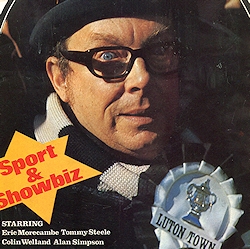A Funny Thing Happened On The Way To The Boardroom
1972 Article

Eric on the cover
.
Is it painful?
I'm writing an article for the sport and showbusiness issue of Sportsworld and I wanted to ask you when do you cast the comic aside and become deadly earnest . . .
About three o'clock in the morning.
. . . about football!
"Oh! Oh, yes. At five to three on Saturday afternoon. That lasts right round to about seven o'clock Saturday night, win, lose, or draw. And in the board room at Luton Town. I'm a director there, you know. And I'm not a yes man! When the chairman says no, I say no."
I tried a different tack to try and sort the wit from the chaff.
"Have you always been interested in football?"
"Oh, yes. My father used to play for Morecambe in the days when it was called Poulton. He used to play for Ken¬dal, too. He broke a leg in Kendal."
We were making progress. So I asked if Eric had played.
"As a boy I used to play. I would have been a schoolboy international had I gone to school."
He was slipping away again, so I tried to pin him down.
"Did you play for Kendal or Morecambe?"
"Oh, good Lord, no! They had my father. That was enough for anybody. I used to play for my school—I played for both the schools I was at, you know, then I came into showbusiness while I was still a kid, so I gave it up. I used to follow Preston in those days. That was the Tom Finney days and before that it was George Mutch and people like that."
Now we were getting somewhere. I managed to find out that he and his son, Gary, began to support Luton Town after Eric had moved to Harpenden. Later, the club chairman, then Tony Hunt, invited him to join the board.
It must have been a happy day for the board. Because the clowning does subside and Eric can talk quite seriously about his ideas.
Such as the 'sin bin'. It's not original, but Eric thinks it is a good idea and at least ought to be tried out for an experi¬mental season among reserve sides.
He feels it would dispense with the fiasco of a glut of bookings and sus¬pensions for trivial and technical offences. And this would lead to better understanding between players and referees. And he has some sympathy for referees in these days when players call for television evidence to help their appeals.
"The referee's job is the loneliest in the world. Players are always going to protest," he said.
"I don't care if Derek Dougan is refereeing, he's still going to be pushed about a bit because it's not the actual playing of the game, it's the money that matters and the position in the League. So there are bound to be protests when players think a wrong decision has been given. But I still think, personally, that whether the referee is good, bad, or indifferent, that you've got to abide by his ruling."
He has views, too, about football as a spectator sport. I asked him how he would improve it.
"Well, I can only be perfectly honest here. I would say—and we can't do it at the moment at Luton, but it will come eventually—by comfort.
"I saw a film on TV the other night and it took you to a baseball stadium in Los Angeles or somewhere which put Wembley to shame. They took you around it in the story and that stadium was like a palace compared with Wembley.
"Everything in America is for the patron. Over here, we're still a little backward—and this applies to Luton as well as any other town. I haven't been in a ground yet which gives me what I want. The nearest are Sheffield Wednes-day and Aston Villa and they're both Second Division."
He laughed: "I haven't seen many First Division grounds!"
The comedian was emerging again, so I quickly asked him:
"Would you like to see a new Wembley?"
"Not particularly a new Wembley, but just a better Wembley. When Wembley was built people thronged to it because it was one of the greats. It isn't any more. It's scruffy. All football is scruffy, I'm afraid. It's not the way it should be.
"I'm not pro-American. I'm not saying that the whole thing revolves around some American coming over here and saying 'This is what you gotta do, kid!' That won't work either. You can't change what we are. But I do think our England team deserves a more modern stadium."
He remembers the great names from his boyhood and youth and, sometimes, he's nostalgic about the old pattern of two-three-five. Modern formations don't mean much to him as a spectator. They are inclined to confuse him. So he gets his own back.
If a rival director comes up to him before a game and asks: 'What system are you playing today, Eric?", he'll keep a straight face and reply, "One-nine-one" or "All eleven—in goal".
Some people claim that football today suffers from a lack of personalities. As a last question, I asked him if he shared that view.
He adjusted his glasses. "Has the game had a bigger personality than Georgie Best of Manchester United?" he demanded. "It's full of characters!"
Including, although I didn't tell him, Eric Morecambe, director of Luton Town.
Get out of that!
© Sportsworld magazine 1972